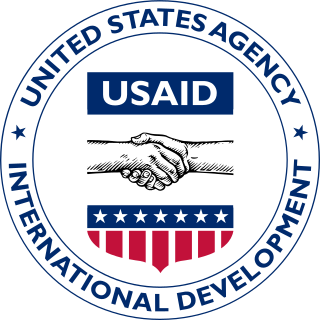Aid is the voluntary transfer of resources from one country to another.
Contents
- Assistance and funding
- People
- Science and technology
- Biology and medicine
- Other uses in science and technology
- Other uses
- See also
Aid or AID may also refer to:
Aid is the voluntary transfer of resources from one country to another.
Aid or AID may also refer to:
ABC are the first three letters of the Latin script.
AI most frequently refers to artificial intelligence, which is intelligence demonstrated by machines.
ADC may refer to:

A non-governmental organization (NGO) is an independent, typically nonprofit organization that operates outside government control. NGOs often focus on humanitarian or social issues but can also include clubs and associations offering services to members. Some NGOs, like the World Economic Forum, may also act as lobby groups for corporations. Unlike international organizations (IOs), which directly interact with sovereign states and governments, NGOs are independent from them.
Adp or ADP may refer to:

The United States Agency for International Development (USAID) is an independent agency of the United States government that is primarily responsible for administering civilian foreign aid and development assistance. With a budget of over $50 billion, USAID is one of the largest official aid agencies in the world and accounts for more than half of all U.S. foreign assistance—the highest in the world in absolute dollar terms.
MDA, mda or variants may refer to:

CARE is a major international humanitarian agency delivering emergency relief and long-term international development projects. Founded in 1945, CARE is nonsectarian, impartial, and non-governmental. It is one of the largest and oldest humanitarian aid organizations focused on fighting global poverty. In 2019, CARE reported working in 104 countries, supporting 1,349 poverty-fighting projects and humanitarian aid projects, and reaching over 92.3 million people directly and 433.3 million people indirectly.
Insemination is the introduction of sperm (semen) into a female or hermaphrodite's reproductive system in order to fertilize the ovum through sexual reproduction. The sperm enters into the uterus of a mammal or the oviduct of an oviparous (egg-laying) animal. Female humans and other mammals are inseminated during sexual intercourse or copulation, but can also be inseminated by artificial insemination.

Africare is a non-profit organization based in Washington, D.C., which provides development aid for Africa. It was founded by Dr. Joseph Kennedy and C. Payne Lucas in 1970, former Peace Corps members who worked in eastern Niger. Africare is the largest and oldest African-American founded international NGO focused exclusively on the continent of Africa. Since 1970, Africare has been improving lives and building a better future by partnering with local communities, focusing on agriculture and food security, healthcare, maternal and child health, HIV/AIDS, access to potable water, and women's empowerment. In more than 40 years of building partnerships with local communities, NGOs, governments and the private sector, Africare has invested over $1 billion in more than 35 countries in Sub-Saharan Africa.

A search-and-rescue (SAR) dog is a dog trained to respond to crime scenes, accidents, missing persons events, as well as natural or man-made disasters. These dogs detect human scent, which is a distinct odor of skin flakes and water and oil secretions unique to each person and have been known to find people under water, snow, and collapsed buildings, as well as remains buried underground. SAR dogs are a non-invasive aid in the location of humans, alive or deceased.

Community organization or community based organization refers to organization aimed at making desired improvements to a community's social health, well-being, and overall functioning. Community organization occurs in geographically, psychosocially, culturally, spiritually, and digitally bounded communities.
Acquired immunodeficiency syndrome (AIDS), is the third stage of HIV/AIDS, a spectrum of conditions caused by infection with the human immunodeficiency virus (HIV).

The United States established diplomatic relations with Malawi in 1964 after Malawi gained independence from the United Kingdom. Malawi's transition from a one-party state to a multi-party democracy significantly strengthened the already cordial U.S. relationship with Malawi. Significant numbers of Malawians study in the United States. The United States has an active Peace Corps program, Centers for Disease Control and Prevention, Department of Health and Human Services, and an Agency for International Development (USAID) mission in Malawi. Both countries have a common history and English language, as they were part of the British Empire.
The Clinical and Laboratory Standards Institute (CLSI) is a volunteer-driven, membership-supported, not-for-profit, standards development organization. CLSI promotes the development and use of voluntary laboratory consensus standards and guidelines within the health care community.
AIM or Aim may refer to:
Assistance is an act of helping behavior.

A voluntary group or union is a group of individuals who enter into an agreement, usually as volunteers, to form a body to accomplish a purpose. Common examples include trade associations, trade unions, learned societies, professional associations, and environmental groups.

Volunteering is an elective and free-choice act of an individual or group freely giving time and labor, often for community service. Many volunteers are specifically trained in the areas they work, such as medicine, education, or emergency rescue. Others serve on an as-needed basis, such as in response to a natural disaster.
Christian humanitarian aid is work performed by Christian non-governmental organizations (NGOs) to alleviate the suffering of people around the world. Humanitarian aid occurs in areas where some churches donate financial resources.